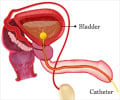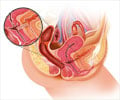Oxybutynin could serve as the ultimate drug for treating hot flashes in breast cancer patients, finds a new study.

‘Oxybutynin is currently used to treat urinary incontinence. In the study, it showed promising results in treating hot flashes in women. This kind of drug was especially useful for breast cancer patients as they are unable to use hormone replacement therapy. The hormone replacement therapy is the current method of treating hot flashes.’





"Hot flashes are a common symptom of menopause and can be even more severe in breast cancer survivors than they are in the general population," says Dr. Leon-Ferre. He says several factors contribute to the increased severity of hot flashes in breast cancer survivors including exposure to chemotherapy, which may bring on early menopause; the use of anti-estrogen drugs, such as tamoxifen or aromatase inhibitors; and the use of medications or procedures to suppress the function of the ovaries.
Hormone replacement therapy, which is sometimes used to treat hot flashes, is generally not recommended for breast cancer survivors. "Hot flashes not only impact a patient's quality of life, but they are also associated with patients prematurely discontinuing breast cancer treatment, which may increase the risk of breast cancer recurrence and mortality," says Dr. Leon-Ferre. "It is important for physicians to have effective options to treat hot flashes."
Dr. Leon-Ferre says previous research had suggested that hot flashes may be relieved with oxybutynin, an anticholinergic agent which interferes with the activity of a neurotransmitter in the brain and the peripheral nervous system. The drug is most commonly used to treat urinary incontinence.
In this study, researchers sought to determine whether oxybutynin was more effective than placebo in treating hot flashes and in improving patients' quality of life. The researchers enrolled 150 women who had experienced at least 28 hot flashes per week over more than a month, and who were bothered enough by them to want medication. Sixty-two percent of the women were on tamoxifen or an aromatase inhibitor for the duration of the study. There were three arms in the trial with patients in two arms receiving different dosages of oxybutynin and patients in the third arm receiving a placebo.
Advertisement
"This study, in addition to previously published work in this area, establishes that oxybutynin is an effective drug for treatment of hot flashes in patients who have relative or absolute contraindications to hormone-based therapy," says Dr. Leon-Ferre. "We were surprised by the rapidity of the response and the magnitude of the effect, considering the relatively low dose of the drug."
Advertisement
Dr. Leon-Ferre said that since oxybutynin is already available for other indications, physicians could potentially prescribe it off-label. However, he says the study did not address long-term toxicities of oxybutynin.
Previous research has indicated that long-term use of this type of drug may be associated with cognitive decline. These possible side effects should be further researched and taken into consideration when physicians counsel patients.
Source-Eurekalert














